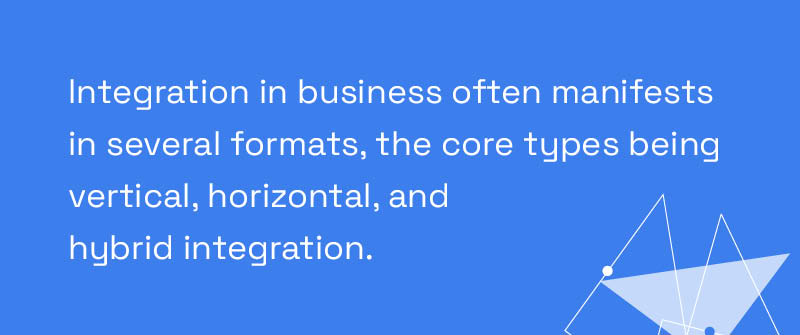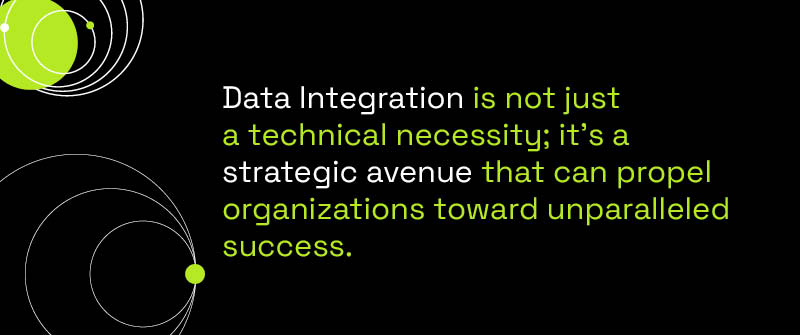
What Is Data Integration With Example?
Understanding Data Integration and Its Critical Role in Modern Organizations
At the heart of every successful business strategy is data integration, the process that ensures disparate data sources are combined into a unified, actionable resource. With businesses constantly generating vast amounts of data across various channels, integrating this data is essential for informed decision-making and strategic planning. Leveraging Business Intelligence Consulting Services can help businesses navigate the complexities of data integration, ensuring seamless alignment with strategic goals.
For modern organizations, successful data integration means streamlined operations, better customer insights, and a competitive advantage in the market. Additionally, it supports various business functions and optimizes business processes, enhancing overall operational efficiency.
P3 Adaptive’s Strategy for Real-world Data Integration Solutions
At P3 Adaptive, we believe that effective data integration goes beyond simply combining data from different sources. Our approach combines data by aggregating and merging information from multiple systems, leveraging Power BI, a powerful tool that not only consolidates data but also provides insightful visualizations and analytics. By employing advanced data integration techniques, P3 Adaptive empowers organizations to see a complete picture, unlocking hidden insights and optimizing their strategies based on comprehensive data understanding. This is all part of Power BI Consulting.
What Is An Example Of Database Integration?
Database integration is a crucial aspect of modern business operations, where disparate databases are cohesively merged to provide unified, accurate, and actionable data. In many organizations, data related to customers, sales, finances, and operations may reside in separate systems. This isolation leads to data silos, hindering comprehensive analysis and strategic decision-making. Successful database integration ensures these multiple sources can interact seamlessly, optimizing data flow and improving organizational efficiency.
P3 Adaptive is at the forefront of facilitating robust database integration solutions for businesses. Leveraging advanced technologies like Microsoft Fabric, we’re able to integrate varied databases into a harmonious system where data consistency, accessibility, and integrity are maintained. Microsoft Fabric serves as a powerful framework that enables us to connect numerous data repositories, eliminating redundancy while ensuring that every piece of information is up-to-date and readily available for analysis.
Incorporating database integration solutions can lead to transformative business success by creating consistent data ecosystems. P3 Adaptive positions businesses to maximize their data’s potential, driving strategic initiatives and achieving measurable growth.
Which Is An Example Of Integration?
Integration in business often manifests in several formats, the core types being vertical, horizontal, and hybrid integration. Each type serves unique purposes and offers distinct benefits tailored to specific organizational needs.

Vertical Integration Example
Vertical integration involves unifying different stages of production or supply chain under a single management umbrella. For example, a company that manufactures smartphones might vertically integrate by acquiring a supplier of key components such as chips. This allows for greater control over the manufacturing process, ensuring consistency and quality in products delivered.
Horizontal Integration Example
Horizontal integration, on the other hand, occurs when a company expands its control within the same level of the value chain. This could be exemplified by a retail company acquiring another retail chain to increase market share and reduce competition. Such integration can enhance the friendly exchange of information within shared systems and improve economies of scale.
Hybrid Integration Approach
Finally, there’s also the hybrid integration approach, which P3 Adaptive frequently utilizes for its clients. This method combines aspects of both vertical and horizontal integration to leverage the benefits of each. Through custom data integration tools like Power BI, P3 Adaptive seamlessly merges multiple data sources, enhancing data visibility and decision-making speed.
Power BI Dashboards for Seamless Integration with Data Integration Tools
P3 Adaptive employs Power BI dashboards as a data integration platform to streamline data flow and eliminate silos. These dashboards offer a user-friendly interface that aligns data from various sources, allowing stakeholders to easily access and interpret critical business insights. By designing bespoke integration solutions, P3 empowers businesses to achieve operational efficiency and strategic agility.
Real-Life Example
A real-life example illustrating P3 Adaptive’s prowess in integration involves a project where various disparate data sources were unified into a singular analytical platform for a multinational corporation. These data integration examples showcase practical applications, enhancing the client’s reporting capabilities, and supplying accurate and timely data that fueled strategic business adjustments, ultimately leading to improved market performance.
What Is An Example Of Data Collection And Integration?
The Role of Data Collection in Shaping Strategic Decisions
In the modern business landscape, the ability to collect and integrate data is not just a competitive advantage—it’s a necessity. This process begins with robust data collection, which is the foundation for insightful analytics and informed decision-making. By harnessing accurate and comprehensive data, businesses can assess their current strategies’ effectiveness and pivot to adapt to new opportunities and challenges. This data-driven approach ensures that strategic decisions are based on empirical insights rather than intuition alone.
Integration of Data Analytics with Real-Time Data Collection Tools
The integration of data analytics with real-time data collection tools marks a significant evolution in how businesses handle vast data streams. Implementing a robust data integration process ensures data quality and enables reporting, which is crucial for making informed decisions. Leveraging advanced platforms like Power BI P3 Adaptive enables seamless integration across various data sources, delivering insights at unprecedented speeds. This integration allows for immediate action on emerging trends, whether it’s shifting market dynamics or changing consumer preferences. By adopting real-time data integration solutions, companies can operate with increased agility, making timely decisions that foster growth and innovation.
P3 Adaptive: Transforming Business with Data Integration Solutions
In the business landscape today, data integration is not just a technical necessity; it’s a strategic avenue that can propel organizations toward unparalleled success. Efficiently connecting disparate data sources into a single, coherent view allows businesses to drive informed decision-making and forge stronger pathways to their strategic goals. But to truly harness this power, choosing the right consulting partner is crucial.
This is where P3 Adaptive shines. Our team of expert consultants leverages cutting-edge technology and industry-leading methodologies to provide comprehensive data integration solutions. We don’t just integrate data; we integrate it in a way that adds value, revealing insights that may otherwise remain obscured.

Choose P3 Adaptive for a Competitive Edge
With P3 Adaptive, data integration transcends simple connectivity – it’s about strategic alignment and creating a competitive advantage for our clients. Our strategies are tailored to meet the unique demands and aspirations of each business we partner with, ensuring that the solutions we implement directly support their objectives.
Real-World Impact Through Expertise
The expertise that P3 Adaptive brings is transformational. For instance, our approach has helped businesses consolidate and streamline their databases, allowing them to achieve smooth operational workflows and unlock new capacities for innovation and agility. By employing ETL processes, P3 Adaptive converts raw data into structured datasets for business applications, whether it’s integrating sales, inventory, and customer data for a retail giant or harmonizing ERP and CRM systems. Our track record speaks volumes about the tangible results we deliver.
We invite business leaders to look into P3 Adaptive’s success stories, each a testament to our prowess in data integration. By engaging with us, you can not only overcome your existing challenges but also envision a future where your data-driven strategies set you apart in your industry.
More than ever, businesses need a reliable partner to unlock insights buried within their data, and P3 Adaptive stands ready to be your guide on this transformative journey. Turn your data into a strategic asset and conquer your most daunting business challenges with P3 Adaptive. Let us empower you with the tools you need for confident decision-making in weeks, not months.
Get in touch with a P3 team member